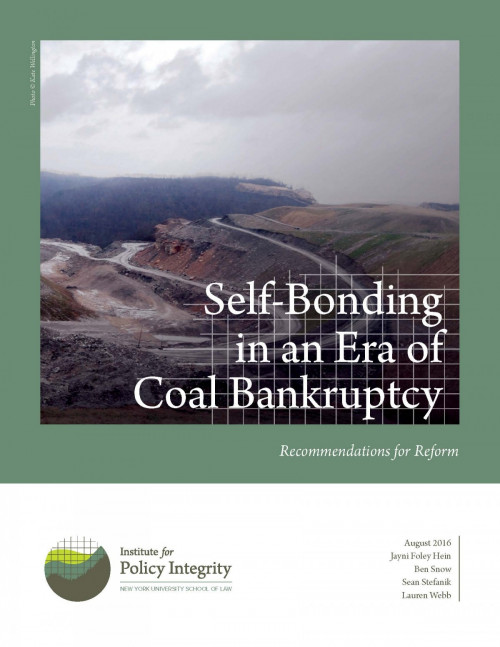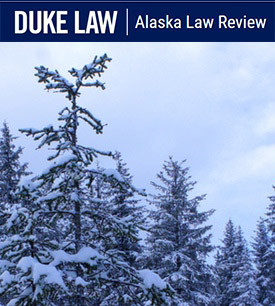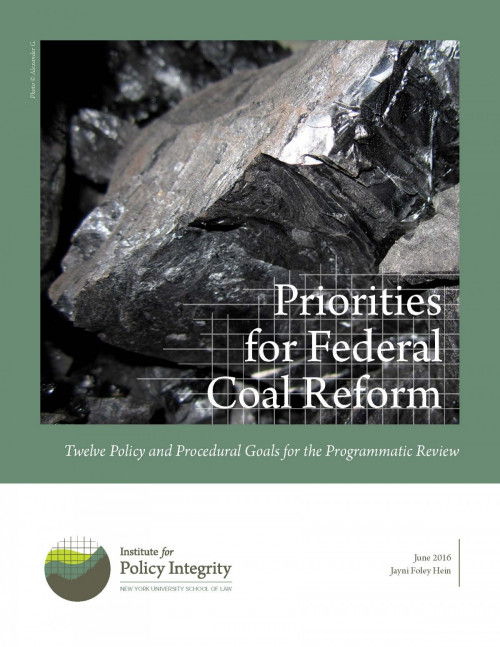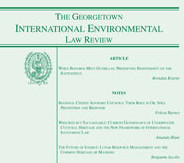-

Self-Bonding in an Era of Coal Bankruptcy
Recommendations for Reform
Federal law requires coal companies to reclaim and restore land and water resources that have been degraded by mining. But at many sites, reclamation occurs slowly, if it all. Mining companies are required to post performance bonds to ensure the successful completion of reclamation efforts should they become insolvent, but regulators have discretion to accept “self-bonds,” which allow many companies to operate without posting any surety or collateral. As the coal industry experiences financial distress and coal companies declare bankruptcy, the viability of future reclamation work is endangered. This report offers recommendations to help regulators better assess coal companies’ financial health and take steps to curtail self-bonding.
-
New York State Clean Energy Standard Final Order
In 2015, New York State announced its Clean Energy Standard, an ambitious mandate to boost clean energy. We have submitted numerous comments to the New York State Public Service Commission, suggesting several changes in the design of this Standard to ensure that the state’s policy goals can be met in the most-cost effective manner. In its final order, the Commission adopted several of our suggested changes. Most notably, the Commission relied on our comments in deciding to calculate zero-emission credit payments based on the Social Cost of Carbon. This marks a major success in our ongoing efforts to encourage government agencies to use the Social Cost of Carbon as a tool when designing policy.
-
New York State Zero-Emissions Attributes Comments
We recently submitted comments to the New York State Department of Public Service Staff regarding their Responsive Proposal for Preserving Zero-Emissions Attributes. This Proposal offers recommendations on how to achieve New York’s clean energy target: 50 percent of all electricity used in the state by 2030 should be generated by renewable energy sources.
-
Comments to SEC on Environmental Disclosures
We recently submitted comments to the U.S. Securities and Exchange Commission on business and financial disclosures related to environmental risk.
-
Hein Testifies at House Hearing on Offshore Leasing
On July 6, Jayni Hein testified at a House Natural Resources Committee hearing on the “Innovation in Offshore Leasing Act.” The hearing, held by the Subcommittee on Energy and Mineral Resources, focused on H.R. 5577, a bill that would amend the Outer Continental Shelf Lands Act to allow internet-based offshore oil and gas lease sales, among other measures. Hein’s testimony covered four main topics, suggesting that the Department of the Interior should: continue to increase transparency and public participation in the offshore leasing process; improve the regulations that underlie the Bureau of Ocean Energy Management’s (BOEM’s) five-year planning process; build on recent progress addressing environmental, social, and economic uncertainty in its five-year Program and lease sales; and advance efforts to account for the environmental and social costs of fossil fuel leasing through royalty rate and other fiscal reform. Hein’s testimony elaborated on some of the arguments from her recent Alaska Law Review article and recent comments to BOEM.
-
Coal Reform Publications, Workshop for Policymakers
As the Department of the Interior continues its review of the federal coal leasing program, we recently released two new publications on coal reform and hosted a related workshop for government officials.
-

Next Steps to Reform the Regulations Governing Offshore Oil and Gas Planning and Leasing
Published in the Alaska Law Review
In this article, we argue that fundamental reform is necessary and highlight a series of key themes and topics that must be addressed to improve the regulatory process and promote better, more consistent management outcomes. While the article draws on examples from frontier areas-in particular the U.S. Arctic Ocean-the recommended changes would apply to and benefit all areas of the OCS.
-

Priorities for Federal Coal Reform
Twelve Policy and Procedural Goals for the Programmatic Review
This report highlights twelve policy and procedural recommendations for the review of the federal coal program. These reforms are intended to help modernize program and so that it can provide maximum net benefits to American taxpayers. The programmatic review should identify opportunities to increase revenue, reduce greenhouse gas emissions, and align federal land management with U.S. climate change goals, paying enormous dividends to the public.
-
Comments on Proposed Offshore Leasing Program for 2017-2022
We recently submitted comments to BOEM in response to its proposed five-year offshore leasing program for 2017-2022. In its proposed program, BOEM qualitatively considers the option value, or informational value of delaying leasing until more information is available on relevant environmental, social, and technological uncertainties. In addition, BOEM will now consider environmental and social costs in its “hurdle price” analysis that helps determine whether and when to offer areas for lease. Building on this progress, we recommend that BOEM take additional steps to strengthen its analysis in line with best practices and OCSLA’s mandate to balance economic, social, and environmental values.
-

Legal Pathways to Reducing Greenhouse Gas Emissions Under Section 115 of the Clean Air Act
The most efficient legal tool for addressing U.S. climate pollution can likely be found in an unused provision of the Clean Air Act. Section 115 of the Act, titled “International Air Pollution,” authorizes the EPA to develop and implement an economy-wide, market-based program to reduce domestic greenhouse gas emissions. This article, jointly authored by a team of law professors and attorneys at three of the country’s leading institutes focused on climate change and environmental law, offers an in-depth analysis of Section 115, which would provide the most flexible approach for achieving the targets from the Paris climate agreement.
